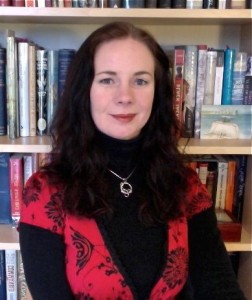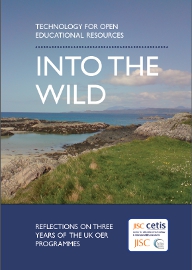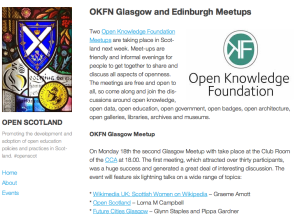Advisory Board Member: Lorna M Campbell
 Time for the second of our blog posts from our new Open Education Working Group Advisory Board.
Time for the second of our blog posts from our new Open Education Working Group Advisory Board.
Lorna M Campbell has already contributed to the Open Education Working Group blog and written about her work on the Open Scotland initiative. Today she talks about her involvement in open education so far. Lorna writes on her own blog: Open World and works for Cetis.
******
Earlier this month I was delighted to be invited to join the Advisory Board of Open Knowledge’s Open Education Working Group. The aim of the group, which is led by Marieke Guy, is “to initiate global cross-sector and cross-domain activity that encompasses the various facets of open education.”
It’s hard to say when my own involvement in open education began. The start of the Jisc / HEA UKOER Programmes in 2009 is an obvious point of reference but many of the programmes and projects I was involved in long before that were concerned with sharing educational resources. Open licences were unheard of when I began working in education technology in 1997 so early projects I was involved with, such as Clyde Virtual University (SHEFC Use of the MANs Initiative) and the Scottish electronic Staff Development Library (SHEFC ScotCIT Programme), took a walled garden approach to sharing. Different methods of sharing, managing and disseminating educational resources were explored and developed over the next decade by a wide range of Jisc development programmes. Some of the ones I was directly involved in include Exchange for Learning (X4L), Digital Libraries in the Classroom, ReProduce, and the Digital Repositories and Preservation Programmes.
It was only with the launch of the Jisc / HEA UKOER Programme that I really got involved with open education as we might recognise it today though. On the surface, the primary aim of the HEFCE funded UKOER Programme was to get openly licenced educational content out there into the public domain, (the metaphor we frequently used was turning on the tap), however the underlying aim to the programme was to raise awareness of OER and embed open education practice within English higher education institutions. In keeping with the experimental and innovative nature of UKOER, Cetis recommended a novel approach to steering the programmes’ technical direction. Rather than identifying specific applications, standards, application profiles and vocabularies, we recommended that the UKOER programmes should adopt an open approach to the use of technology and standards. No descriptive standards, exchange mechanisms or specific technologies were mandated, thus allowing projects the freedom to choose the tools or technologies that best suited their requirements. The only provisos were that all projects should use the programme tag ‘ukoer’ and represent the resources they released in the Jorum national repository.
 This open approach to technology and standards enabled us to learn from real world practice and to surface technical issues and problem areas. As a result, Cetis role in the UKOER Programmes was more conversational than directional. We monitored projects’ progress with the adoption and use of a wide range of technologies, applications and resource description approaches and helped to identify common technical issues. At the end of UKOER we synthesised the technical outputs of the programmes and produced an open ebook called Into the Wild: Technology for open educational resources. Even this book was a result of open practice! The book was the result of booksprint using the open source Booktype platform and an open draft was shared with the community for input and comment.
This open approach to technology and standards enabled us to learn from real world practice and to surface technical issues and problem areas. As a result, Cetis role in the UKOER Programmes was more conversational than directional. We monitored projects’ progress with the adoption and use of a wide range of technologies, applications and resource description approaches and helped to identify common technical issues. At the end of UKOER we synthesised the technical outputs of the programmes and produced an open ebook called Into the Wild: Technology for open educational resources. Even this book was a result of open practice! The book was the result of booksprint using the open source Booktype platform and an open draft was shared with the community for input and comment.
Working with the UKOER Programmes was a hugely rewarding experience and I think its fair to say that we all learned a lot, not just about open education technology, but also about the culture and practice of sharing. Measuring the impact of short-term innovation funding programmes is notoriously difficult, but looking back now, two years after the end of UKOER, it really does look like the programme made a real difference in raising awareness of OER and embedding open educational practice in the English higher education sector.
Since the end of the UKOER Programmes in 2012 I’ve continued to engage with a wide range of open education developments, including the US Learning Registry initiative, Creative Commons, the Learning Resource Metadata Initiative, Wikimedia UK and the Open Knowledge Foundation.
More recently I’ve been involved with the Open Scotland initiative. Open Scotland is a voluntary cross sector initiative, led by Cetis, the Scottish Qualifications Authority, Jisc Regional Support Centre Scotland and the Association for Learning Technology’s Scotland Special Interest Group. The aim of Open Scotland is to raise awareness of open education, encourage the sharing of open educational resources, and explore the potential of open education policy and practice to benefit all sectors of Scottish education. To further these aims, we have recently launched the draft Scottish Open Education Declaration. This declaration builds on the UNESCO 2012 Paris OER Declaration but the scope has been widened to focus on open education more generally, rather than OER specifically.
The cornerstone of the Open Scotland initiative is our belief that open education can promote knowledge transfer while at the same time enhancing quality and sustainability, supporting social inclusion, and creating a culture of inter-institutional collaboration and sharing. I believe that open education can expand access to education, widen participation, create new opportunities for the next generation of teachers and learners and prepare them to become fully engaged digital citizens. I know that these are goals and beliefs that the OKF Open Education Working Group shares and I am privileged to have an opportunity to contribute to this group.
 Open Education Working Group
Open Education Working Group 




Leave a Reply